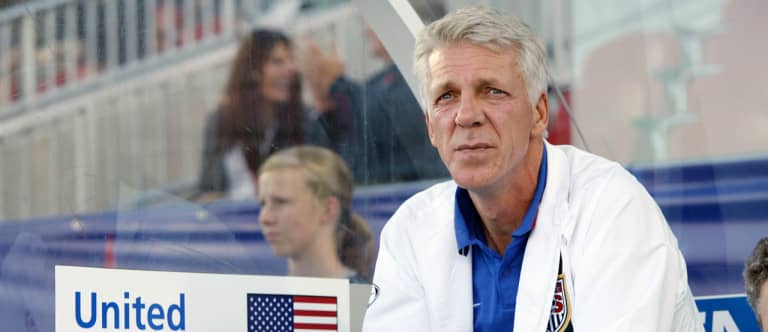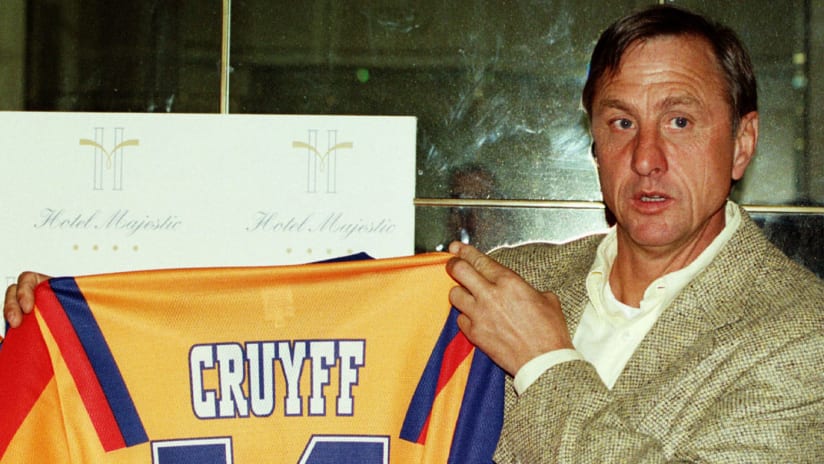It was love at first sight for Thomas Rongen when he encountered Johan Cruyff half a century ago.
Rongen was just a child, and his father took him to see his first Ajax Amsterdam game at the De Meer Stadion. Cruyff wasn't yet the genius who would help implement the revolutionary “Total Football” concepts, the game as we know it today -- at least nobody knew that yet -- just a young, exceedingly gifted player.
There was something special about this Cruyff kid, and Rongen was smitten.
“There he was, and he became an instant idol of mine,” said Rongen, the only man to serve as head coach for four MLS clubs. “He wasn't an idol of anybody in Holland yet -- these were his early, young Ajax years -- but as Dutchmen who came through the Ajax system, he was our hero, our idol.
“We all wanted to be Johan Cruyff.”
Rongen would enjoy a singular view of the Dutch legend's life, first as a fan, then as a teammate, as a confidante and as part of Cruyff's family, and Friday he remembered his longtime friend as “an amazing guy, a great human being, an incredible player we all learned so much.”
Cruyff, one of the greatest figures in soccer's rich history, died Thursday at home in Barcelona after a five-month battle with lung cancer. He was 68.
Rongen, in Guatemala City for the US national team's World Cup qualifier Friday night, praised his friend during a phone conversation with MLSsoccer.com.
“He is the most influential person, not just player, in the last five or six decades in this game,” Rongen said. “He started at Ajax a revolution that carried through the game. He influenced the generation that came after him and all those coaches who played with [and for] him.”
The “Total Football” idea, which emphasized a 4-3-3 alignment with constant interchange all over the field and of which Cruyff was seen as the figurehead, brought Ajax and the Dutch national team to global prominence in the early 1970s and created the landscape that has led to Barcelona's dominance over the past decade and Spain's international success.
Rongen, nine and a half years younger than Cruyff, watched it evolve as an adolescent fan and then as young player at AFC, Amsterdam's other club. He got to know his hero in 1979, when both signed with the North American Soccer League's Los Angeles Aztecs.
“Here I am, finally being able to touch and being able to play with the idol that I had for so many years,” Rongen said. “That was pretty cool, I must say.”
Cruyff became more than a mentor, inviting his young countryman, then just 22, into his home.
“I made $12,000 a year in 1979 and 1980, and his family took me in for six months,” said Rongen, who would join Cruyff with the Washington Diplomats in 1980. “I became part of the family. I watched his kids grow up. They were great for me, they really, really were.
“He was passionate, he loved his family, a great family. He never let people see that side of Johan.”

Cruyff taught Rongen plenty on the field, with the kind of bluntness he was known for -- a trait, Rongen says, common in Amsterdam.
Cruyff arrived in LA about six weeks into the NASL campaign and debuted at the Rose Bowl against the Rochester Lancers. He came off the bench to score two goals, including a “brilliant” winner.
“After the game, he came up to me and said, 'Thomas, you're an OK player, but not great,' ” Rongen said. “ 'All you seem to do is win the ball' -- because I was a holding midfielder -- 'play it to me and don't worry about it.' And that stuck with me.”
He admits the sharpness of the appraisal “hurt me a little bit,” but Cruyff's judgment was spot-on, and Rongen noticed as the season proceeded that Cruyff was a quick study, gaining thorough understanding of his teammates' and opponents' strengths and weaknesses and using it to his best ends.
A year later, after a Diplomats defeat against the New York Cosmos, Cruyff taught Rongen another lesson.
“I go into a halfway tackle with Giorgio Chinaglia and [Roberto] Cabanas, and I let Cabanas win on a give-and-go, and they scored to win,” Rongen said. “In front of every player, he really pinned me against the wall.
“Took me by the throat, he pushed me against the wall, and he said, 'You know what, we're playing for bonuses here. And we just lost $500. You're taking money and food off the plates of our children. Don't let it ever happen again.' And it didn't.”
Rongen says Cruyff was “very driven, but he was a great teammate. And he was exceptional. He enjoyed playing chess. He loved Fischer -- Bobby Fischer was his favorite guy -- and he'd talk about moves and being ahead of the game, and he'd try to teach me on a daily basis. He was totally engrossed in the game both on and off the field.
“If he's had SAT scores, he would have been off the charts. He's always very intelligent, both on and off the field, especially on the field, but he's got a crazy streak through him, too. I think at that level -- Maradona, Messi might be a little bit different -- their personalities were they were always playing on the edge, both on and off the field. Johan was one of those guys as well.”
Cruyff returned to Europe after the 1980 season, to play for Levante, Ajax and then Feyenoord before embarking on his managerial career. Rongen remained in the US, playing in the NASL until it folded following the 1984 season, then continuing on for another decade, mostly in Florida, while beginning his coaching career.
Rongen guided the Tampa Bay Mutiny to the Supporters' Shield in 1996, MLS's inaugural season, then won the MLS Cup/Shield double with D.C. United in 1999. He also coached the New England Revolution and Chivas USA, spent a decade as the US under-20 head coach, then took charge of American Samoa's 2014 World Cup campaign, which was chronicled in the 2014 documentary “Next Goal Wins.” He since has served as Toronto FC's academy director and head coach of the current NASL's Tampa Bay Rowdies.










